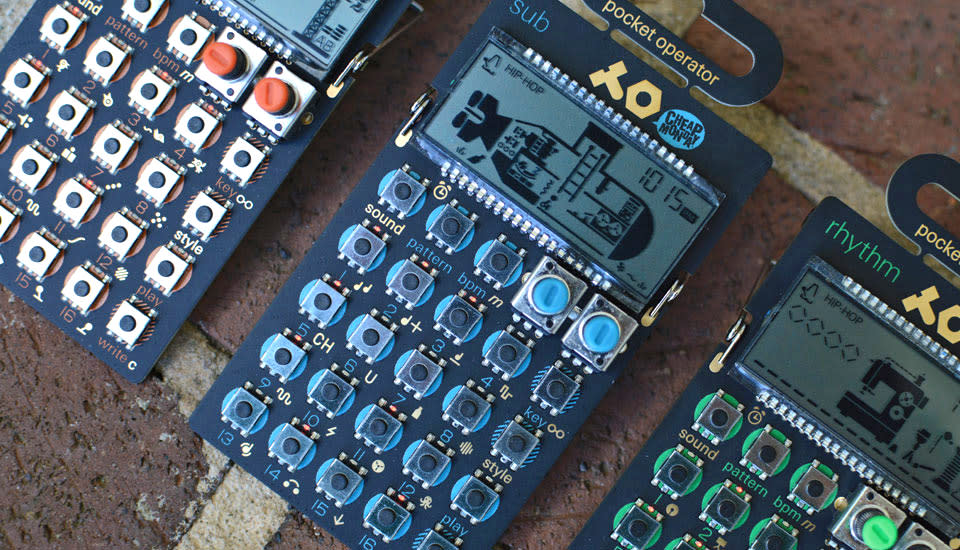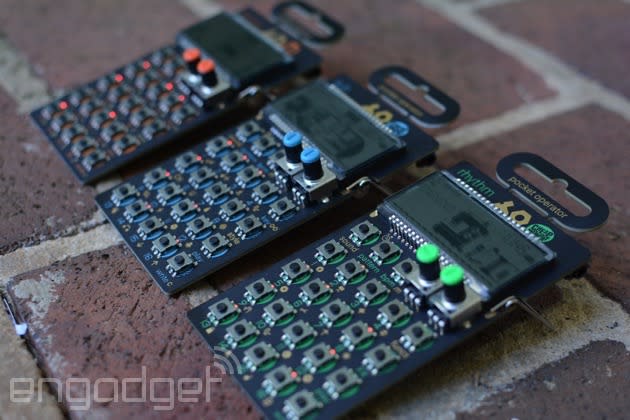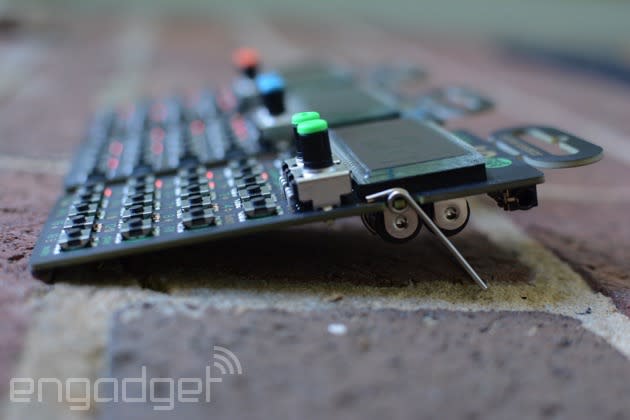Making beats with Teenage Engineering's pocket-sized synthesizers

When I first heard about Teenage Engineering's Pocket Operators at last year's Moogfest, I was pretty skeptical. A card-sized digital synth in your pocket? Sure, it sounds cool. And yes, the folks at Teenage Engineering certainly have the know-how to make something like that happen, but I needed to get my hands on one to be sure. After spending the last few weeks pushing buttons and turning knobs on the battery-powered loop makers, I can say without a doubt that spending $59 on one of these bad boys is a decision you won't regret -- even for a novice like me.
The three Pocket Operators are, individually, a drum machine (PO-12 Rhythm), a bass synth (PO-14 Sub) and a melody maker (PO-16 Factory) -- and each costs $59. Aside from the panel of multi-function buttons and a pair of knobs, each unit has a display that lets you know what tempo, mode and other tools you've selected. It also provides a great animation when you're playing back a created track. The audio stuff is awesome, but the moving pictures are a really nice touch, especially for a set of pocketable instruments that folks at any skill level can enjoy.

How do they sound? Excellent. I was shocked at how great the audio is, and you can pipe it into a more robust audio editor like Adobe Audition or GarageBand. When you loop all three with 3.5mm cables, five sync modes determine how the signal from each is processed. The five presets toggle stereo, mono and sync for the input/output signal. This is how you decide if you want to send the signal to the next unit or output stereo audio to headphones, a speaker or a laptop. No matter what, the first Pocket Operator in the setup will be the so-called master, so it's the one that's used to control tempo. Of course, you could also sort the loops and record them individually before combining them with audio software. When I wasn't routing them to a computer, my preferred setup with all three synced was just a pair of B&O H6 headphones. If I'm honest, these were a nice chance to step away from the keyboard for a bit. Don't take my word for it though; here they are in action:
The PO-12, PO-14 and PO-16 come preloaded with a library of samples (16 total), so you can start making noise with the gadgets as quickly as you can install a pair of AAA batteries around back. For the individual parts, each one packs 16 sounds and 16 effects that can be set to either one of the three tempo presets (Hip-Hop, Disco or Techno), or tweaked to anywhere between 60 and 206 bpm (beats per minute). There's a write mode too, which allows you to tweak the pre-loaded sequences or make your own from scratch using the built-in 16-step sequencer capable of banking, you guessed it, 16 loops.

I must admit that I wasn't so adventurous at first, and I spent a considerable amount of time putting together the included audio from each to compose different sounds. Once I got a handle on some of the individual noises each Pocket Operator was capable of, I moved on to building my own loops from the ground up. I found that while you can sync the trio to play tones simultaneously, the best way to layer loops on top of each other (so I could easily keep track) was to record a 15-second loop for each in Audition. From there, it was a matter of muting and rearranging to find some combination of noise that I liked -- and that wouldn't make my dog cower in fear.
In the weeks that I've spent tinkering with these things during my spare time, I feel like I haven't even scratched the surface of all their possibilities. They're certainly capable of producing loops and larger compositions for projects much more refined than a bit of goofing off. If you're thinking about producing tunes at home, but don't want to commit a load of money to the hobby just yet, try one of these. There are certainly worse things you could blow $60 on. You might stumble upon a love for making music from the comforts of your desk that you haven't yet discovered.























